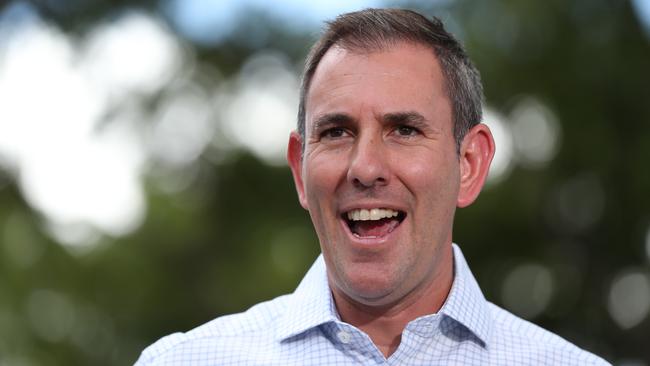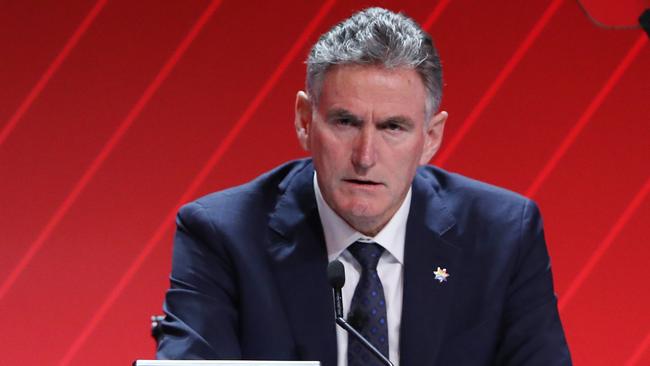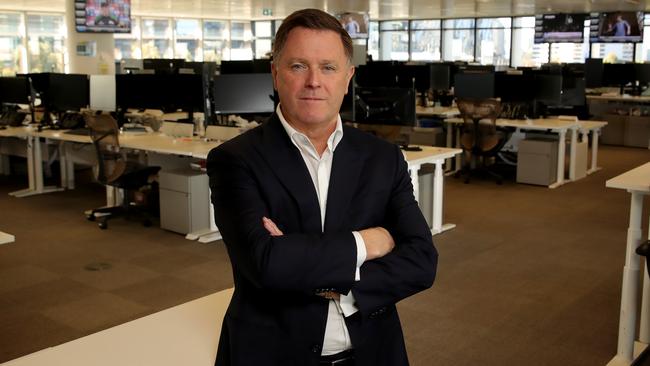Banking heavyweights back government’s measures to accelerate economy’s greening
Banks back the federal government’s greening of the economy by introducing sovereign green bonds, expanding home ratings and bringing in measures to stop greenwashing.
The big banks are backing the federal government’s plan to accelerate the greening of the economy, including the introduction of sovereign green bonds, consistent clean energy standards and home ratings, and measures to clamp down on false claims.
Jim Chalmers announced a string of measures on Friday – after an investor and industry roundtable in Brisbane – and highlighted “vast opportunities” available to business and the government from the transition to a lower-emission economy.
The government said it would co-fund the initial development phase of an Australian sustainable finance taxonomy, or set of definitions, in partnership with industry as a way of having verifiable categories of sustainable investments and activities.

A separate measure will see the government expand the national energy performance rating scheme for houses to existing residential properties, or some eight million homes. That will provide a system of energy efficiency measurement for older homes.
The government also unveiled plans to start a sovereign green bonds program in mid-2024, that will facilitate investors being able to support projects linked to the nation achieving net zero emissions by 2050.
The final measure was tipping a further $4.3m into the corporate regulator to assist a crackdown on misleading sustainability and green claims by companies, known as greenwashing.
Commonwealth Bank chief executive Matt Comyn labelled the roundtable a “constructive conversation” between business, industry and government.
“It will be very helpful to get consistency across the industry for sustainable finance, so we certainly welcome and support that,” he told The Weekend Australian.

“The residential housing pathway to get to the 1.5 degrees scenario, clearly that relies on a number of changes, both … the greening of the grid but also a number of changes and technologies that need to be available.”
Mr Comyn outlined measures such as increasing the efficiency of household devices and improving the insulation in homes as ways of reducing residential emissions.
Banks – which have copped criticism from climate groups for continuing to finance fossil fuel companies and projects – are keeping close tabs on emissions in their lending portfolios as they also manage their own energy transition.
The residential sector represents about 11 per cent of Australia’s carbon emissions.
ANZ’s head of institutional banking, Mark Whelan, said expanding energy efficiency ratings across new and existing homes was positive.

“We see this approach as right and we have a responsibility to assist all customers in that (energy transition),” Mr Whelan said. On having consistent definitions and standards in the area, Mr Whelan said: “It’s important that the data is available, accurate and verified.”
ANZ is also positive on the introduction of sovereign green bonds, and Mr Whelan noted “huge appetite” from global and local investors for government and green bonds more broadly this year.
“This will also better align us with overseas markets, giving certainty to onshore and offshore borrowers and investors while unlocking much-needed capital for green and social initiatives,” he said.
National Australia Bank chief executive Ross McEwan said the bank supported the development of sustainable finance definitions, particularly as “structural change” was required to transition the economy to net zero.
“It is critical to ensure we have credible and consistent labels for what is ‘green’,” Mr McEwan said.

Westpac CEO Peter King supported the government’s proposals and indicated that the bank would roll out a new green loan in September.
“We want to encourage customers looking to build a new home to consider more energy-efficient designs which could help reduce their emissions and power bills,” Mr King said.
Households have been grappling with soaring inflation and power bills, coupled with 10 rate rises by the Reserve Bank since May last year.
The Treasurer on Friday noted that the “highest priority” for the government in the May federal budget was announcing measures to deal with cost-of-living pressures, including higher energy bills.
“Our prospects in this defining decade will be determined by how we manage and maximise this clean energy transformation,” Dr Chalmers said.
The Australian sustainable finance taxonomy was pitched as a way to attract more green investment by helping investors to target their particular sustainability objectives and have more confidence in their decisions.
The Australian Sustainable Finance Institute’s chief, Kristy Graham, said the absence of a targeted taxonomy in Australia was “a significant barrier” to investment in the nation’s climate solutions and clean energy.
“The idea is that it covers the biggest sectors of the economy, so energy, manufacturing, agriculture, mining and metals, buildings, and provides, in most cases, quantifiable criteria for activities in those sectors,” Ms Graham said. “The transition criteria ratchet and change over time as we get closer to 2050.
“Without that clarity, investors are all making their own assessments of sustainability credentials, and there are huge transaction costs involved.”
The taxonomy would provide a handbook or agreed criteria around the sustainability of an activity or asset being assessed, and Ms Graham said Australia could draw on existing work by the EU, Association of Southeast Asian Nations, Singapore and about 30 taxonomies globally.
The ASFI has already started work on assessing existing offshore taxonomies and expects the local project, in its entirety, will take another 18 months to two years.
Cbus acting CEO Kristian Fok said: “Increasing investment in clean energy is a critical component of Australia’s energy transition, but transition is broader than the energy sector.”








To join the conversation, please log in. Don't have an account? Register
Join the conversation, you are commenting as Logout